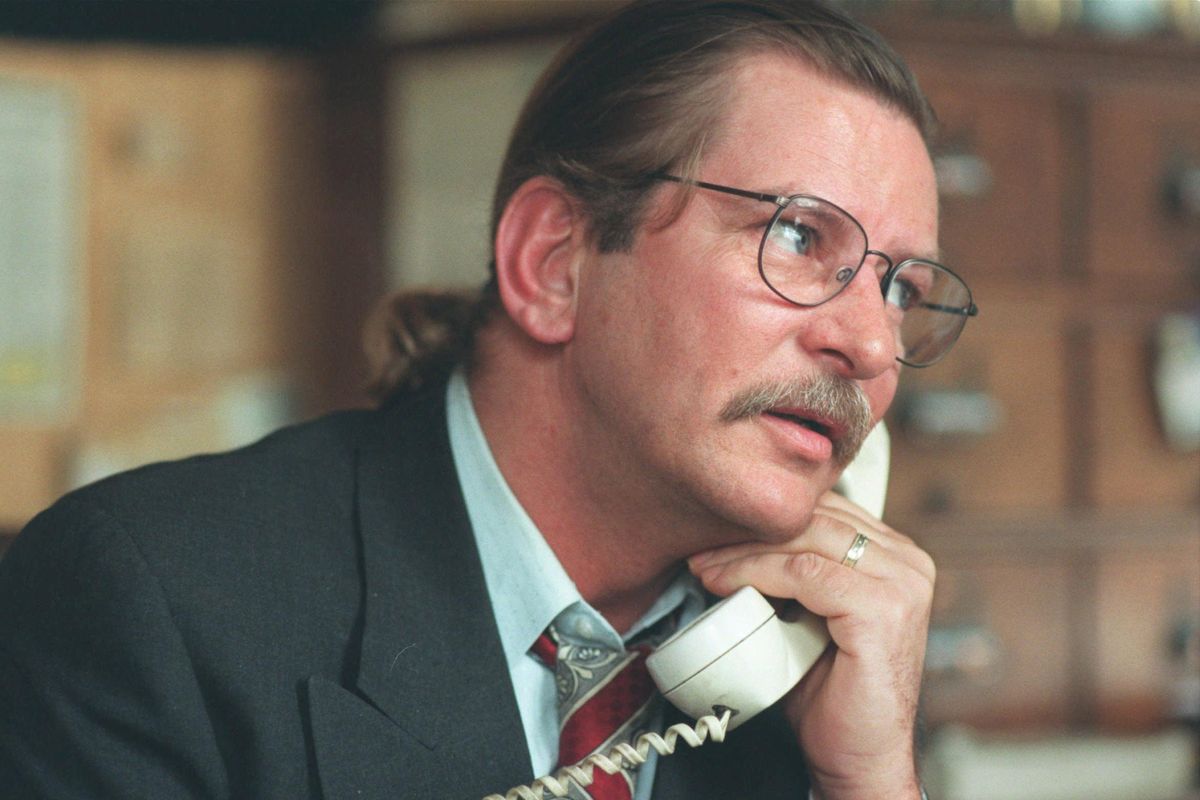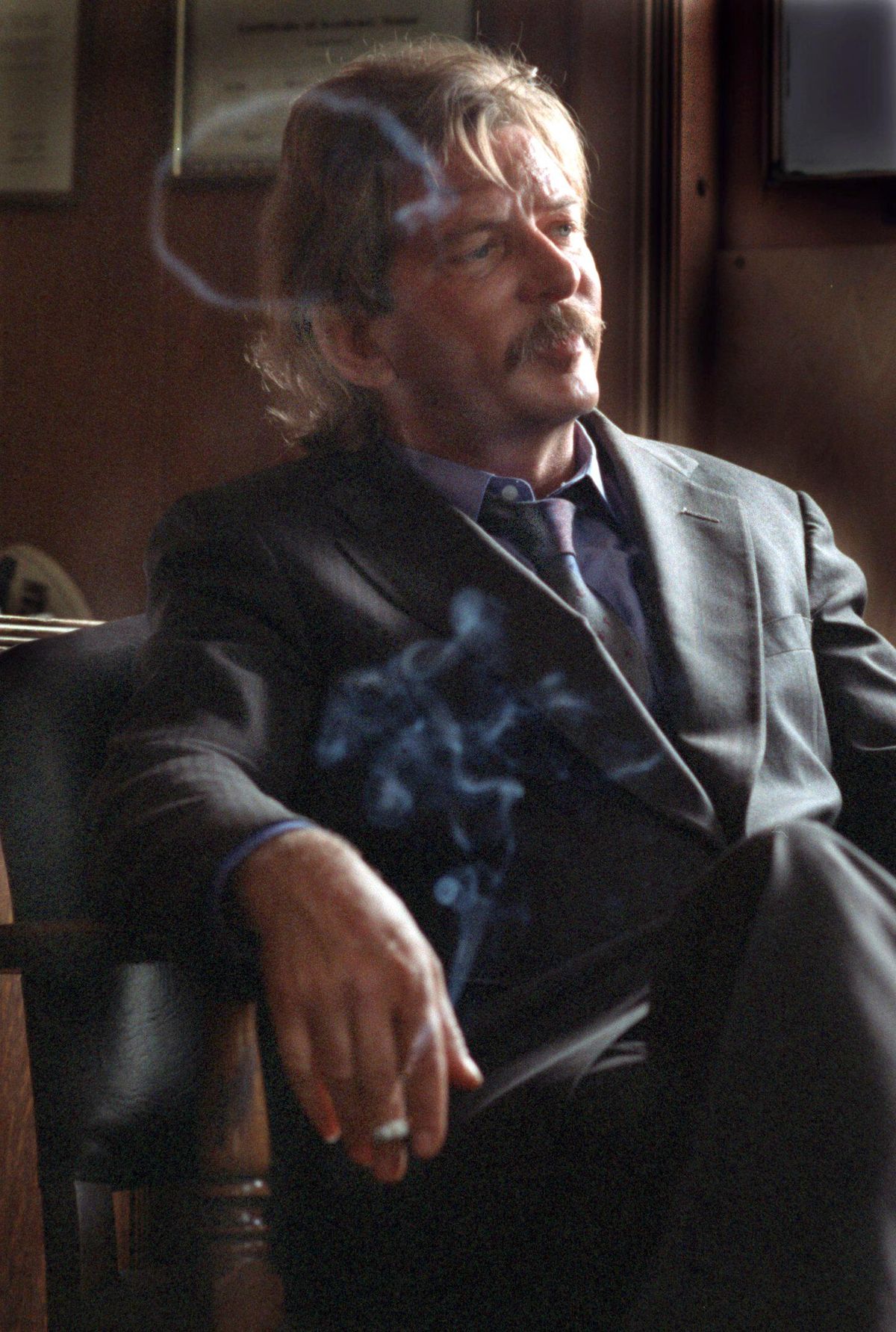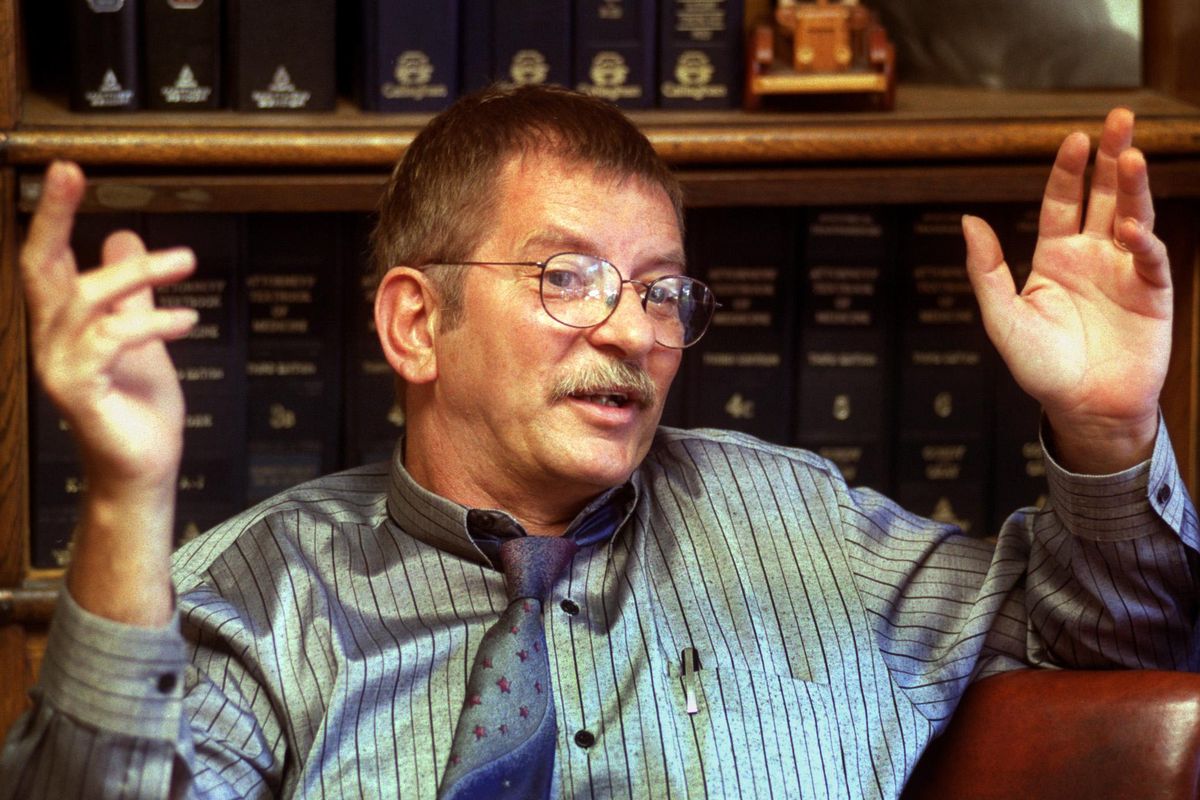This column reflects the opinion of the writer. Learn about the differences between a news story and an opinion column.
Doug Clark: Farewell to Pat Stiley – a true Spokane original
Pat Stiley, a longtime Spokane-area attorney, has passed away. (FILE / SR)
He was the ultimate original.
Outlandish. Outrageous. Hilarious.
Spokane attorney Pat Stiley was every one of those things, and it pains me to report that this character I was proud to call a friend is gone.
Stiley, 70, died Friday at Providence Sacred Heart Medical Center following a lengthy run of heart problems, said Frank Cikutovich, his longtime law partner.
One thing’s certain. My hometown will be a lot less interesting without Stiley around.
Because of the oversized imprint he made, I’m betting there will be quite a gang gathered at the Satellite Diner & Lounge at 3 p.m. Saturday to bid Stiley farewell. The Satellite, 425 W. Sprague Ave., was one of Stiley’s favorite haunts.
Everybody who knew him has a favorite Pat Stiley story.
Take the St. Patrick’s Day the lawyer appeared before the late Spokane Superior Court Judge Marcus Kelly.
Stiley had purposefully not donned any visible hue of the shamrock, thus laying a comical trap for the judge to fall into.
Sure enough, Judge Kelly asked Stiley: “Where’s your green?” with an Irish lilt to his voice.
To which Stiley gleefully dropped his slacks to reveal the bright green underwear he’d put on that morning.
Stiley’s explanation was that he had no choice, said a laughing Jeffry Finer, a longtime friend and attorney who once worked in Stiley’s firm.
He claimed he was merely complying with a “judicial order.”
Classic Stiley.
Or how about the day, Cikutovich recalled, when Stiley showed up six minutes late to federal court, Judge Justin L. Quackenbush presiding.
Cikutovich said the no-nonsense Quackenbush called Stiley on his tardiness and fined the lawyer $600 – a Ben Franklin for each minute.
The following day, after the judge had taken the bench, Stiley stood and uttered the following:
“Your honor. I was four minutes early this morning. I’d like credit on my account.”
Quackenbush laughed when I relayed this tale, saying he couldn’t recall it, but “wouldn’t deny it.”
Then he turned serious.
“I always enjoyed having Pat in court,” said Quackenbush, now senior judge for the U.S. District Court, Eastern District of Washington.
He was always “prepared and a true defender of those who needed his excellence.”
“… Pat was a guy who never backed down any from a case just because it was difficult,” Quackenbush said.
And that’s the nut of it.
For all his whimsy and pranks, Stiley could deliver the goods. He defended hundreds of clients over the years, concentrating mainly on criminal and drug (especially marijuana) cases.
Years before pot became legal, Stiley’s business card was a packet of rolling papers that bore the Washington statute governing medical marijuana along with his firm’s address and phone number.
Stiley famously represented the Gypsy defendants in their claim against Spokane that grew out of a botched police raid on Marks family homes.
Finally, in 1997, the city agreed to settle for $1.43 million.
In a news story at the time, Stiley explained that his clients fell short on getting the city to also agree to more training for police in cultural awareness.
“We were rebuffed,” Stiley said, “but I think $1.43 million is a sufficient apology for my clients.”
Stories abound about Stiley’s legendary photographic memory. And I’d be the first to call baloney if I hadn’t seen his wizardry in action.
While interviewing him one day, Stiley’s cellphone rang. Someone from his firm needed help on complicated case law.
Stiley paused a moment, stared at the ceiling and began rattling off verbatim passages from some legal volume, including the page numbers of the information.
Then Stiley came out of his trance, said goodbye and returned to the question I had asked him.
“The smartest man I’ve ever met in my life,” said Cikutovich, who named his first son Pat as the ultimate tribute to his friend. “In court, there was no stopping him.”
“He was brilliant,” agreed Stiley’s son, Blue. “He knew the law upside down and would give the shirt off his back to anyone.”
It’s true. Money meant little to Stiley, who always took his criminal cases on a handshake-only basis.
He was known for picking up tabs, buying lunches for the entire office and handing out $20 bills to street people.
Cikutovich said he once asked his partner why he kept giving $20 bills to panhandlers. The response he received was Stileyesque:
“So when they see me on the street they won’t want to talk to me again because they owe me money,” he reasoned.
Make no mistake. Stiley had his demons.
He drank too much. He smoked too much. There were times when he played too hard and ignored the people in his life who should have mattered most.
But he had a tender heart for those in trouble, and he hated injustice with a passion.
Not many know that Stiley once attended a seminary in Oregon where he became proficient in Latin, said Kimmie, his wife of 23 years.
He fell away, she added, telling everyone, “If God wants me, he’ll call back.”
I met Stiley back in the early 1990s. He took me to his favorite watering hole, a lounge on West Sprague Avenue that closed eons ago.
We found a seat at his favorite booth, where Stiley told me a lot about himself between a chain of Marlboro cigarettes and tumblers of Crown Royal.
I believe that’s the first time he told me how he’d paid an elderly skywriter $2,000 to fly over the U.S. Pavilion and write “I-M-P-E-A-C-H N-I-X-O-N” in the skies as then-President Richard Nixon gave his speech to open Spokane’s Expo ’74.
Two days prior to the event, however, the old flyboy chickened out, breaking Stiley’s heart.
In the days of the Vietnam War, Stiley was a warrior in the counterculture, an activist whose leftist leanings led him into law.
In a 1981 interview with The Spokesman-Review, Carl Maxey, Spokane’s late-great civil rights lawyer, talked about how he’d first met Stiley as a client.
It was after Stiley had been arrested during a demonstration in which he carried a protest sign up the stairs of City Hall.
“Maxey represented him on a charge of disorderly conduct and won the case,” the story reported.
Maxey also saw talent in Stiley and encouraged him to get his law degree. Stiley did just that and wound up a partner in Maxey’s firm.
“Pat would argue in court, and you could hear Maxey in his voice,” Cikutovich said. “That was his foundation.”
Pat Stiley will also be remembered as an early pioneer in the now well-established practice of working remotely.
It seems so normal now. Hell, thanks to a laptop and the internet, I even write nearly all my columns from home.
But back in 1999 such an arrangement was beyond rare. Yet that’s the year Stiley moved his family to Belize (about 90 miles south of Cozumel, Mexico) while continuing to practice law in Spokane via emails and computer links.
Many in Spokane’s legal community scoffed at the notion and doomed it to failure.
Stiley, however, may have been the nation’s only virtual attorney. He made it work, researching criminal defense cases and personal injury lawsuits. He used videoconferencing to interview clients and emailed written motions back to his firm on West Broadway Avenue.
In typical Stiley fashion, he once videoconferenced with a judge, who saw the remote lawyer on the computer monitor showing proper respect in a shirt and tie.
“He was naked from the waist down,” Kimmie said. “He was giggling the whole time, because the judge didn’t know it.”
You can’t just make up a guy like Pat Stiley. Like I said before, he was the ultimate original.
(509) 459-5432
dougc@spokesman.com



